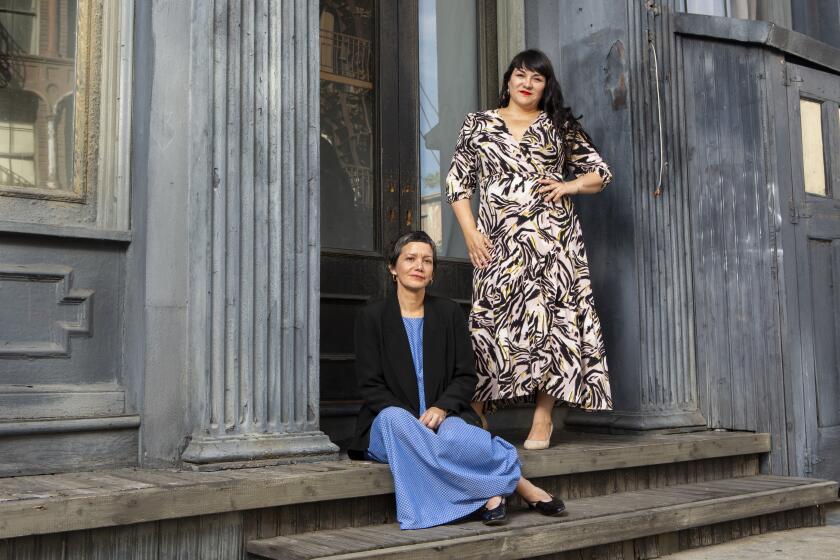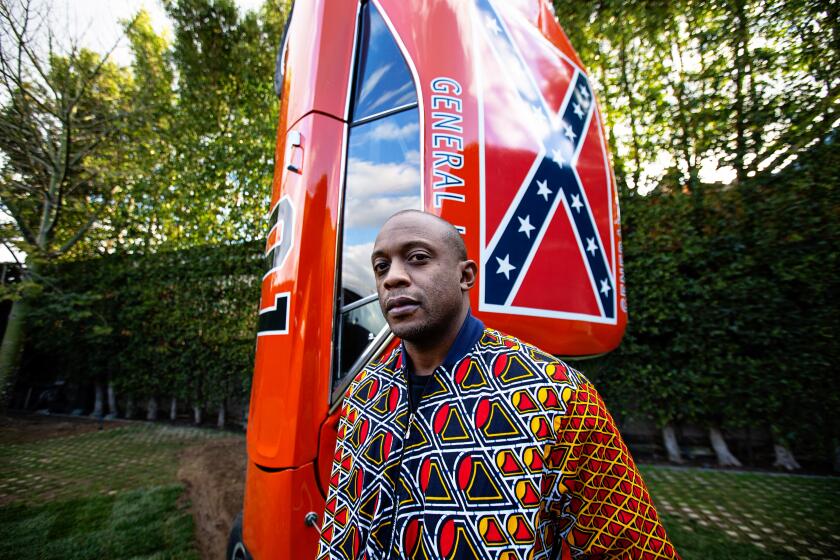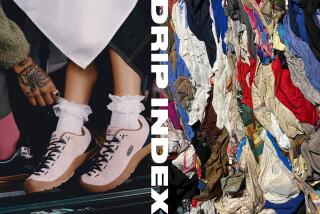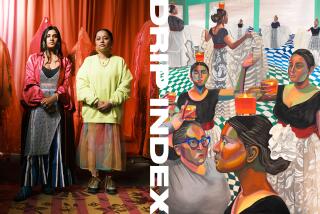Frieze Week launches with Getty Museum gathering and Barbara Kruger celebration
Frieze Los Angeles, the sophomore outing of the London-based global art fairs’ West Coast edition, kicked off Thursday with VIP collectors’ hours beginning at 10 a.m. But Frieze Week, the series of public and private happenings that supplement the main event at Paramount Pictures Studios, began on Monday with a reception at the Getty Museum.
Frieze Fairs director Victoria Siddall, Frieze Los Angeles executive director Bettina Korek, the Broad founding director Joanne Heyler, Museum of Contemporary Art director Klaus Biesenbach, Studio Museum of Harlem director Thelma Golden, artists Marina Abramovic and Alex Israel and L.A. County Supervisor Mark Ridley-Thomas were among the art world insiders who gathered for cocktails, a performance by actor and playwright Liza Jessie Peterson (“an artivist,” she called herself, adding that “my art and my activism are fused together”) and a panel exploring the mission of the nonprofit Art for Justice, which works to create work opportunities for people transitioning from prison.
Catherine Gund — a filmmaker and activist whose mother, philanthropist and art collector Agnes Gund, founded Art for Justice in 2017 — introduced the discussion with a brief history of the organization and an affirmation of its mission: “to lift the unmatched power of art and advocacy in ending mass incarceration.” Speaking with her on the panel were artist Hank Willis Thomas, poet and legal scholar Dwayne Betts and advocate Tyra Patterson. Betts and Patterson, both of whom spent years incarcerated, spoke of the barriers for those transitioning out of prison.
For Frieze Projects inside this year’s Frieze Los Angeles, curators Rita Gonzalez and Pilar Tompkins Rivas asked artists to examine the representation of Latinos and others in movies and on TV.
“I couldn’t even open a bank account,” said Patterson, who has been free for just two years after more than two decades behind bars. “It is not just us who need to act,” she added, addressing the audience directly. “It’s people like you who can leverage your privilege. Our liberations are tied together.” Betts recalled that even with a law degree from Yale, he felt the “residual harm” of his conviction as he entered the legal profession.
Thomas drew a clear line from art to activism, especially around issues of criminal justice reform: “Creativity is obviously the only thing that might save us, along with generosity — and a healthy bit of fear,” he said. “My real, fundamental question is: What act of creativity might allow a police officer for a split second to see me as a human being?”
“Easy Rider’s” chopper “Captain America” got trashed too. Hank Willis Thomas crunches history, race and Hollywood tropes in his first solo show in L.A.
Following the powerful discussion, Endeavor CEO Ariel Emanuel began his remarks with praise for Gund’s work: “It’s rare than an Emanuel is humbled,” he said. Endeavor acquired a majority stake in Frieze in 2016 and Emanuel, an advocate for criminal justice reform, helped arrange for artist Mark Bradford to create “Life Size,” a work that highlighted the issue during 2019’s Frieze Los Angeles. A stark image of a police body camera, “Life Size” appeared on posters around the city and as a large-scale billboard on location at Paramount; proceeds from a limited-edition print series raised $1 million for Art for Justice.
Emanuel quickly ceded the floor to Endeavor Foundation’s Romola Ratnam, who announced two new initiatives: “Out of Bounds,” an exhibition of works at Frieze by artists imprisoned in California; and the Frieze Impact Prize, a $25,000 grant to recognize “justice-involved artists contributing to the movement [against] mass incarceration,” Ratnam said. Juried by Emanuel, Agnes Gund and artist Kahlil Joseph, among others, the prize will be awarded at Frieze New York in May.
Curator Venus Lau’s plans for the Film & Talks series include Otomo, Cao Fei, Adrian Villar Rojas, Jon Rafman, Tao Hui, Cheng Ran and Wong Ping.
The Getty event and a Monday luncheon at NeueHouse Hollywood served to kick off not just Frieze Week but also a goodbye tour of sorts for Korek, who in March begins her new role as CEO of the Serpentine Galleries in London. Artist Israel and philanthropist Nicolas Berggruen were among those attending the luncheon, which celebrated Barbara Kruger’s mural “Who Buys the Con?” installed Feb. 1 on NeueHouse’s Sunset Boulevard-facing facade. The work is just one element of the artist’s continuing series “Untitled (Questions),” an ever-expanding collection of existential queries with 20 new works — displayed on street banners and billboards at locations throughout L.A. — created for this year’s Frieze.
NeueHouse’s VP of cultural programming, Meredith Rogers, was quick to share credit for the Kruger installation — first proposed by Korek in fall 2019 — with building owner Kilroy Realty, the Office of Historic Resources and L.A. County Council Office, District 13. “Who Buys the Con?” is set to remain on view through February, Rogers said, adding, “We hope it can stay up as long as the question remains unanswered.”
More to Read
The biggest entertainment stories
Get our big stories about Hollywood, film, television, music, arts, culture and more right in your inbox as soon as they publish.
You may occasionally receive promotional content from the Los Angeles Times.













